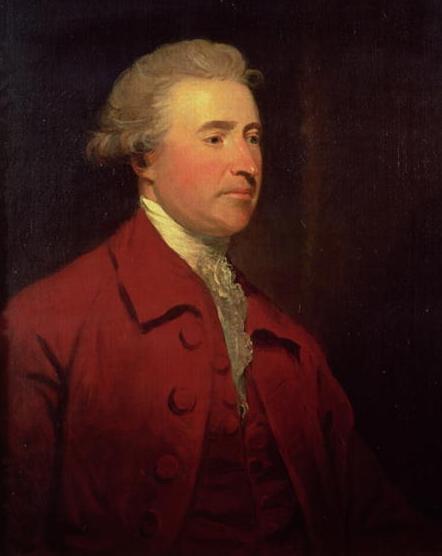Speech on the Independence of Parliament (1780)
Edmund Burke Quotes
Works of Edmund Burke Volume ii, p. 117
Second Speech on Conciliation with America (1775)
Speech at Bristol Previous to the Election http://books.google.com/books?id=DAAUAAAAYAAJ&pg=PA435&dq=%22we+are+generally+cold,+and+languid,+and+sluggish%22&hl=en&sa=X&ei=D4TSUuXqDYrekQe6uoH4Cw&ved=0CFAQ6AEwBQ#v=onepage&q=%22we%20are%20generally%20cold%2C%20and%20languid%2C%20and%20sluggish%22&f=false (6 September 1780)
1780s
“Jacobinism is the revolt of the enterprising talents of a country against its property.”
No. 1
Letters On a Regicide Peace (1796)
“There never was a bad man that had ability for good service.”
15 February 1788, Third Day, volume x, p. 54
On the Impeachment of Warren Hastings (1788-1794)
“You can never plan the future by the past.”
Letter to a Member of the National Assembly (1791)
A Letter to a Member of the National Assembly (1791)
Letter to Matthew Smith
Undated
Thoughts on the Cause of the Present Discontents (1770)
“The march of the human mind is slow.”
Works of Edmund Burke Volume ii, p. 149
Second Speech on Conciliation with America (1775)
Second Speech on Conciliation with America (1775)
Robert Bisset, The Life of Edmund Burke. Volume II (London: G. Cawthorn, 1800), pp. 428-9
Undated
Second Speech on Conciliation with America (1775)
Reflections on the Revolution in France (1790)
“Falsehood has a perennial spring.”
First Speech on the Conciliation with America (1774)
“Politics and the pulpit are terms that have little agreement.”
Reflections on the Revolution in France (1790)
Reflections on the Revolution in France (1790)
Reflections on the Revolution in France (1790)
Works of Edmund Burke Volume ii, p. 117
Second Speech on Conciliation with America (1775)
First Speech on the Conciliation with America (1774)
“Toleration is good for all, or it is good for none.”
Speech on the Bill for the Relief of Protestant Dissenters (7 March 1773)
1770s
Source: An Appeal from the New to the Old Whigs (1791), p. 442
“It is the nature of all greatness not to be exact.”
First Speech on the Conciliation with America (1774)
“Nothing is so fatal to religion as indifference.”
Letter to William Smith, Member of the Irish Parliament (29 January 1795), quoted in R. B. McDowell (ed.), The Correspondence of Edmund Burke, Volume VIII: September 1794–April 1796 (Cambridge University Press, 1969), p. 128
/ 1790s
Preface to Brissot's Address (1794)
1790s
Volume iii, p. 344
Reflections on the Revolution in France (1790)
Source: An Appeal from the New to the Old Whigs (1791), p. 442
Letter to a Member of the National Assembly (1791)
A Letter to a Member of the National Assembly (1791)
“I have in general no very exalted opinion of the virtue of paper government.”
Second Speech on Conciliation with America (1775)
“One that confounds good and evil is an enemy to the good.”
15 February 1788
On the Impeachment of Warren Hastings (1788-1794)
Reflections on the Revolution in France (1790)
A Vindication of Natural Society (1756)
“No sound ought to be heard in the church but the healing voice of Christian charity.”
Reflections on the Revolution in France (1790)
“Frugality is founded on the principle that all riches have limits.”
Speech on the Independence of Parliament (1780)
“They defend their errors as if they were defending their inheritance.”
Speech on the Independence of Parliament (1780)
Volume iii, p. 497
Reflections on the Revolution in France (1790)
No. 1, volume v, p. 286
Letters On a Regicide Peace (1796)
“A state without the means of some change is without the means of its conservation.”
Reflections on the Revolution in France (1790)
“The first and the simplest emotion which we discover in the human mind is Curiosity.”
Part I Section I
A Philosophical Enquiry into the Origin of Our Ideas of the Sublime and Beautiful (1757)
“The art of substantiating shadows, and of lending existence to nothing.”
Burke's description of poetry, quoted from his conversation in Prior's Life of Burke
Undated
The reference is to Charles Townshend (1725–1767)
First Speech on the Conciliation with America (1774)
Works of Edmund Burke Volume ii, p. 115
Second Speech on Conciliation with America (1775)
“A conscientious man would be cautious how he dealt in blood.”
Letter to the Sheriffs of Bristol (3 April 1777); as published in The Works of the Right Hon. Edmund Burke (1899), vol. 2, p. 206
1770s
“To tax and to please, no more than to love and to be wise, is not given to men.”
First Speech on the Conciliation with America (1774)
Reflections on the Revolution in France (1790)
“Laws, like houses, lean on one another.”
From the Tracts Relative to the Laws Against Popery in Ireland (c. 1766), not published during Burke's lifetime.
1760s
“To speak of atrocious crime in mild language is treason to virtue.”
Attributed in Captain William Kidd: And Others of the Pirates Or Buccaneers who Ravaged the Seas, the Islands, and the Continents of America Two Hundred Years Ago (1876) by John Stevens Cabot Abbott, p. 179
Undated
“Better to be despised for too anxious apprehensions, than ruined by too confident a security.”
Reflections on the Revolution in France (1790)
